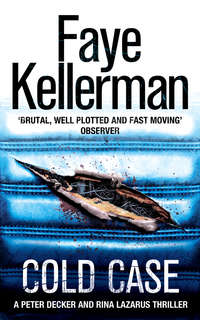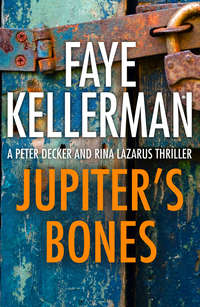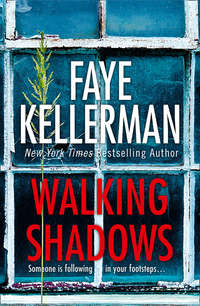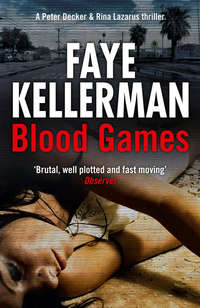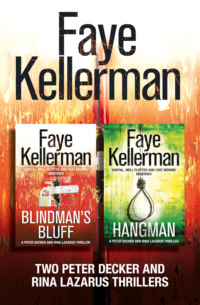
Полная версия
Sanctuary
Marge looked at Decker. The woman suddenly became pale. “You’re the police, no?”
Marge took out her ID. “Yes, ma’am, we are the police.”
“Orit, please. This is my brother’s house. I haven’t heard from him in going on two days.”
“What makes you think something’s wrong?” Marge asked. “Maybe he went on vacation.”
“Impossible,” Orit stated. “Dalia works at my office; she didn’t say anything. The boys are in the middle of school. The school knows nothing. Besides, I come here yesterday. They are still getting the paper and their mail.” She craned her neck to look up at Decker. “My brother’s a diamond dealer. He deals in big stones and lots of cash. It’s hard times. People do funny things. You never know. I’m worried about my brother.”
Marge and Decker exchanged glances, then pulled out their notebooks. Marge said, “You think your brother might have been involved in something … illegal?”
Orit bristled. “Impossible. My family has been in the diamond business for over a hundred years. Our family name is Yalom, which means diamond. My father taught us to cut diamonds before we could read. Arik wouldn’t do shady business. But there are others who are maybe not honest.”
“Are you thinking about anyone specifically?” Decker said.
Orit bit a red bottom lip. “No. No one particular. You go in, okay?”
Marge said, “The officers who were out here yesterday said everything looked fine.”
Orit waved her hand in the air. “I didn’t like them—their attitudes. They looked unhappy to help me. Like why is this crazy foreigner wasting our time.”
“I’m sure that wasn’t the case,” Marge said.
She shrugged. “Fine. You can think what you want.”
“Did you tell the officers that your brother’s a diamond dealer?” Decker asked.
“No. Why should I give personal information to people who sneer at me? You two at least take out notebooks and look like you’re listening. You pretend good.”
Decker smiled. “We’re not pretending. We’re here to serve the community. When was the last time you heard from your brother?”
Orit said, “Two days ago. I called police yesterday, then again today. I don’t like this. I’m nervous.”
“Place seems pretty quiet,” Marge said. “Family have any pets?”
“No. Arik doesn’t like animals.” Orit sighed. “Maybe I’m over-acting. But this is crazy. Arik wouldn’t leave without telling me. Dalia wouldn’t leave without telling me. And the boys? Where are the boys? Why would they pull them out in the middle of the term and not tell me—even for a few days?”
“Do they go to the local high school?” Marge said.
“Yes. My daughter is in the same class as Dov. Gil is a grade older.”
“Have you asked your daughter about her cousins?” Marge asked.
“Yes, of course, what you think?” Orit shook her head. “She knows nothing. Something’s wrong.”
Decker slipped his notebook into his suit jacket, then ran his hand through ginger hair. “Do you want to open the door for us?”
Again, Orit began hunting through her purse. “Yes. I can wait out here?”
Marge said, “You can wait out here.”
Orit pulled a key from her valise. “Ah, here it is.” She snapped open the dead bolt and pushed the door wide open. “Take your time and look around.” She gave them a wan smile. “Please, tell me I am hysteria. Tell me I’m wrong.”
3
The first thing Marge noticed was how cold it was inside. Lots of stone and marble—elegant but not friendly. Footsteps echoed as she and Decker ambled around the massive two-story entry. The house appeared to be a center-hall plan—living room to the right, dining room to the left, and straight back was the family room. She stopped and peered upward at a coffered ceiling fifteen feet away.
“Pretty nifty spread. Guess diamonds are recession proof.”
“Guess so.”
“What do you think about Ms. Bar Lulu?” Marge asked.
“She made me curious.”
“Me, too,” Marge said. “Think she knows more than she’s letting on?”
“Maybe.” Decker looked around. The place was massive, made even a person as big as he was feel small. First thing Decker noticed was an ornate, oversized mezuzah on the doorframe—a sterling-silver sculpture of vines and grape leaves and fruit. In his house, it would have looked grossly out of place. But here, it added to the splendor. Yet something about it disturbed Decker. He shrugged the feeling off.
“I’ll take the downstairs, you take the upper story … stories. I thought I saw some dormer windows. Could be just a storage attic.”
“Or a place to stuff bodies,” Marge said. “I’ll holler if I notice something.”
“Ditto.”
Marge disappeared. Sketching the floor plan, Decker took in the entry area. It was big enough to be furnished—a large center table holding abstract scuplture, flanked by a couple of brocade wing chairs. Two open-shelf display cases sat against opposite walls. The one on the left, announcing the dining room, contained china plates on stands. The right sidewall held figurines and a bowl.
Decker studied the pieces in the case on the right wall. There were two multicolored porcelain fighting dogs, a set of cloisonné parrots, a set of aqua vases decorated with fire-breathing dragons, and a simple green bowl with a cracked glaze that probably cost a month’s salary.
He stared at the pieces, eyeing them longer than he should have. The dogs were standing in a perfect line, the bright-colored glazes running into one another. The bowl was obviously the centerpiece of the cabinet. It took up a shelf by itself. The parrots looked very old; the blue enamel was dulled and drab. The vases were shaped like a thermometer bulb, dragons snarling as they encircled the bases and curled up the stems.
Interesting pieces, yet, again, something about them was off kilter. The house was taking on the appearance of an Escher drawing—lots of steps leading nowhere. He exhaled forcibly, then shrugged it off and moved on. He walked through an arched doorway and stepped into the living room.
It was more a museum than a room in a house—cavernous, with a vaulted ceiling and a white marble floor covered at strategic spots with lush, floral area rugs. Artwork adorned apricot-colored walls that were topped with carved crown molding. The furniture was grand—giant sectional sofas holding tapestry pillows and throw covers. Lots of tables but no lamps on them. Decker looked up. Small, recessed lights were set into ceiling molding.
He began to jot down some notes.
Lots and lots of porcelain—vases and figurines sitting on tables, resting on the mantel and in a six-foot-long mirrored display cabinet. An expensive collection, yet the pieces didn’t appear to be affixed to the surfaces. He wondered if the Yaloms had earthquake insurance.
He went on.
There was a semicircular outpouching off the living room. Decker stepped inside, turning on the light switch with a latex glove. A high-gloss wood-paneled space filled with books. The library. Neat … clean … nothing seemed out of order.
He reversed directions to examine the other side of the first floor. The dining room was designed on the same large scale as the living room. One entire wall was taken up by a breakfront that sparkled with china and crystal. Another wall was the backdrop for an antique clock.
Yalom seemed well-heeled. Once, Decker would have assumed the man rich. But the last decade’s pernicious policy of spend-now, pay-later made it hard to tell. Decker wondered how many of the items had been bought and paid for. He walked through the butler’s pantry and into the kitchen.
It was bigger than Marge’s apartment—a sterile expanse with white lacquer cabinets and dark granite counters. A booth was tucked into the corner. He ran a gloved finger over the surfaces. They seemed clean, at least devoid of blood.
Women are murdered in the bedroom, men in the kitchen.
Decker opened the cutlery and utensil drawers. Nothing seemed to be missing, the carving knives seemed to be complete.
Decker continued to open the kitchen cabinets. The couple was obviously Jewish, but they didn’t appear to keep kosher. Decker found only one set of everyday dishes and one set of fancy china. He turned the plate over. Limoges—tref Limoges. For some stupid reason, he was bothered by Israelis not keeping the dietary laws, especially since they had a grandiose mezuzah in the entry hall.
He thought a moment, then looked at the kitchen doorframe. No mezuzah. That wasn’t unusual. Only Orthodox homes seem to have mezuzahs on every doorframe.
Onward—through the kitchen into a utility bathroom and a service porch. The door leading out to the backyard was locked. He flipped the bolt and scanned the rear portion of the property. Most of it was taken up by pool and patio. A long strip of flowers against a stucco wall marked the end of the property. It didn’t look large enough to bury bodies, but he’d check it out later.
Back inside into the family room. Like the library, it was wood-paneled. But the room was lighter, the walls’ picture frames fashioned from blond, burled maple. The furniture was casual, but expensive. There was a large leather sectional littered with patterned pillows and woolen throws; off to the side were suede game chairs around a green felt-top table. One wall was taken up by a floor-to-ceiling fireplace; opposite the hearth was a mirrored wet bar. The mirrored shelves held cut-glass crystal and a modern glass-sculptured menorah. Decker had to look twice but that’s what it was. The two remaining walls were hung with family photos. Decker took a closer look at the snapshots.
The Yalom boys as babies, as toddlers, then as bar mitzvahs holding the Torah, with their prayer shawls draped over their shoulders. They were still prepubescent in the religious photos. A year later—in graduation pictures from junior high—the boys showed progression toward adolescence. The most recent pictures captured the boys doing sports—basketball and soccer for one, swimming for the other.
From Orit, Decker knew the boys were a year apart. But it was damn near impossible to tell which one was the elder from the photos. After studying the pictures for the longest time, he came to the conclusion that Gil was the swimmer—he had a small mole under his eye. Dov, according to Orit, was a year younger.
Handsome kids—muscular, with curly black hair and dark eyes. They looked like their dad. There were several family photos—a few formal eight by tens and one casual eleven by seventeen group picture. Dad and the boys were standing, dressed in T-shirts and denim. Seated in front of them was Mom, wearing a flowing, flowered dress and laced-up boots.
Mom.
She looked out of place—a different genetic strain, with light eyes, poker-straight auburn hair, and a peaches-and-cream complexion. Her expression was soft, the eyes seemed gentle. The body language of the photo showed the boys leaning toward her, not the father … whatever that meant. Kids usually felt closer to their mother.
He walked over to the wet bar and looked in the drawers. Inside were bottle openers, ice tongs and pick, glass stirrers, plastic toothpicks, and an ice pick. Lo and behold, it wasn’t covered in blood.
Decker tapped his pencil against his notebook. On a superficial level, everything seemed fine. He closed his notebook and went upstairs.
“Four bedrooms,” Marge said. “Parents’ room, guest room, and each of the boys had his own room.” She brushed her toe against the soft maroon carpeting of an upstairs circular landing. “The boys shared a bathroom; the master bath is a marble palace.” She threw up her hands. “I didn’t grid-search the place, but I looked carefully. Nothing jumped out at me. How about you?”
“Nothing slapped me across the face, either,” Decker said. “What about the attic?”
“Unfinished. Nothing up there except for furnace equipment. Did you take a peek under the house?”
“Just crawl space except for a small wine cellar which looked untouched.”
“No secret torture chamber?”
“Not that I could find.” Decker perused his notes. “The garage had all three cars in it. I also looked around the yard, in the pool house, in the flower bed. Nothing.”
“I did find a few pieces of luggage,” Marge said. “They don’t have a perfectly matched set. There could be a piece missing and I wouldn’t know. Clothes seem complete, but again—take a pair of pants out, who’d know the difference?”
“They’re going to make this hard on us,” Decker said. “I’ve got a couple of questions. This guy’s supposed to be a big diamond dealer, right?”
“Right,” Marge said. “You’re wondering if there is a safe. None that I could find. I looked in closets, behind pictures, underneath area rugs. I take it you came up dry as well. Otherwise you wouldn’t be asking the question.”
“What a pro,” Decker said. “No, I came up empty.”
“Nothing in the cellar?”
“Unless it’s behind all those collectible bottles. I didn’t pull them all out.”
“And I didn’t look behind the furnace in the attic,” Marge reported. “But I did check out the toilet tank—where druggies hide their stash. Nothing. Did you check the freezer?”
“Yep. There was food and ice—the H2O kind.”
“Why don’t we ask Sis about the safe? See what she has to say. What’s the next question, Rabbi?”
“The guest bedroom upstairs. I did a quick search inside. There were no clothes in the closet or in the dresser. The bathroom was spotless—no toothpaste mucking up the counter or sink. It was also decorated with guest towels, not regular towels.”
Marge was puzzled. “Guest towels generally go in the guest room.”
“That’s the point,” Decker said. “It is definitely a guest room.” He rolled his stiff, beefy shoulders. “There was no maid’s room downstairs, Margie. A house this big … think Mom cleans it by herself?”
Marge said, “So the maid isn’t a live-in. You want to know who she is.”
“It’s always good to take a look at the staff.”
Marge’s eyes lit up. “You’re thinking an inside job?”
“I’m just thinking out loud.”
Marge laughed. “So I’m leaping to conclusions. It relieves the boredom. I’ll go ask Sis to step inside now. You want to do the primary questioning?”
“You do it,” Decker said. “It’s officially your assignment.”
Marge paused, then shook her head.
“What?” Decker asked.
“There’s something spooky about this case.”
“Agreed,” Decker said. “We comb the house and everything looks in military order. There are clothes in the closet, food in the refrigerator, and three cars in the three-car garage. Everything’s perfect except where are the people? It’s as if the place had been nuked with a neutron bomb.” He paused. “Ready to talk to the sister?”
Marge nodded. They walked down the stairs into the marble entry. Suddenly Decker placed a hand on Marge’s shoulder, stopping her from opening the front door.
“Wait a second.” Decker crooked his finger, then pointed to the display cabinet. “What is wrong with this picture?”
Marge stared at the case. “What do you mean?”
“Something looks … out of place.”
Marge eyed the pieces up close, then took a step backward and studied the case. “The shelves are open. Aren’t most display cabinets enclosed?”
Decker said, “Now that you mention it, that’s a little weird, too. But that’s not what’s bothering me.”
Marge took another step forward and scanned the pieces one by one. The top glass shelf was host to two fighting dogs, the second one held a simple green bowl, the third had a set of metal parrots, and the bottom one gave support to two aquamarine vases with bas-relief dragons on them.
“Nothing looks broken.”
“Nope.”
“Strange dogs,” Marge commented. “All those colors dripping into one another. And the aggressive pose. Their backs are arched and they’re baring their teeth. They’re disconcerting.”
Decker nodded. It was the dog statues. Something about them was bugging him. He zeroed in on the teeth. Each statue had four pronounced canine teeth—two uppers and two lowers, all of them perfectly pointed. Not a chip or a crack to be seen.
Marge brushed hair out of her eyes. “You know, Pete, if I were displaying the dogs, I’d have them facing each other instead of lining them up tail to trunk, elephant style—”
“That’s it,” Decker interrupted.
“That’s what was bothering you?”
“On the nose,” Decker said.
“You’re more of an aesthete than I gave you credit for.”
Decker laughed. “You know why it looks off?”
Again, Marge looked at the pieces.
“It’s the parrots, Marge,” Decker said. “The parrots are facing each other. But the dogs aren’t.”
Marge said, “So what does that have to do with the price of eggs in Outer Mongolia?”
Decker shrugged. “Maybe nothing. But I’ll ask Sis about it anyway.”
“She’ll know why the dogs aren’t facing each other?”
“Maybe she helped Mom position the pieces,” Decker said. “Just maybe she knows how much eggs cost in Asia.”
4
As she tucked the phone receiver under her chin, Rina’s attention was diverted by Hannah’s babbling. She was sitting next to her baby, the two of them playing on a comforter spread out on the living-room floor. It was a busy blanket, toys sewn into the quilting—a mirror, a teething ring, several blocks that squeaked, and lots of fuzzy decals. But Hannah had grown tired of eliciting peeps from the bunny’s tummy. She started to complain.
Of course, the phone rang. Rina made the big mistake of picking up the call. Hannah’s vocalizing increased in volume and frequency every time Rina spoke into the mouthpiece. The baby soliloquy finally culminated in a loud, wet raspberry.
“Hold on, Honey.” Rina attempted to swipe Hannah’s mouth. The baby protested with a shake of the head and a loud abababababa.
Honey said, “Should I call back later, Rina?”
“No, we’re really fine. She’s just expressing her opinion.”
“She sounds adorable,” Honey said. “I love babies. I love children. I think it’s the innocence. I should have had a dozen more.”
Honey sounded riddled with regret. So much so, Rina wondered why she didn’t have a dozen more. Within their culture, it wasn’t the least bit unusual to find families with kids numbering in the double digits. It gave Rina pause for thought. Maybe something had prevented Honey from having more. Maybe they had a lot more in common than Rina had first thought.
“Just enjoy her,” Honey went on. “I don’t have to tell you this, but they do grow up so fast. One minute they’re snuggle bunnies, the next minute, they’re big boys who’ll maybe give you a peck on the cheek on your birthday.” She giggled. “At least I get a peck. I know quite a few women whose sons refuse to touch them.”
“That’s ridiculous,” Rina said. “Negiah—men and women touching—doesn’t apply to mothers and sons.”
“Of course it’s ridiculous,” Honey said. “So what else is new? The Rebbe is just floored by this extremism. Sure he doesn’t like phones. But machines are one thing, love is another. Love is what’s important. Love between Man and Hashem, between Man and Man, between Man and Woman—it’s what makes the world such a beautiful place. Love is what distinguishes us from the animals.”
Rina looked at Ginger, the family Irish setter. The big, rust-colored animal was seated on the blanket as well, her snout nuzzling Hannah’s leg. Rina didn’t know a lot about dogs—she’d married Peter, she’d married his animals—but it seemed to her that Ginger had an infinite capacity to love. Rina had always felt that it was conscience and repentance that made man different from animals. But Honey sounded so sincere, and her thought was a nice one.
“Love is wonderful,” Rina said. “We have wonderful families, Baruch Hashem.”
Rina heard a stretch of quiet. She could make out background noises, someone asking for a dozen poppy-seed bagels.
Honey said, “Rina, thank you for getting back to me so fast. And thank you for putting us up. I can’t tell you how excited I am to be actually going on vacation.”
“I’m glad, Honey.”
“Ababababababbam,” Hannah shouted. “Yeeeeeeee!”
Rina gave the baby a bottle. “Do you want me to call the old gang for you?”
A pause. Then Honey said, “Truthfully no. I just want an opportunity to spend some time with the kids away from people. That’s why—” She stopped herself.
“That’s why you called me,” Rina said. “It’s okay. I’m not offended. You want to relax away from everyone. The community has grown, Honey. It used to be we knew everyone who wore a yarmulke. Not so anymore. It’s pretty easy to go about your business without someone bugging you. But I don’t think it’ll ever fully lose the provincialism. It’s what makes us close. But we both know it can be a little restricting.”
“I just need a vacation.” Honey sounded desperate. “You don’t know what a tova you’re doing. Thank you so much.”
“You’re welcome.”
Hannah threw her bottle across the living room. Immediately, Ginger leaped to her feet to retrieve it. At first when Hannah had learned to toss items, Ginger would chase after them, then sit by them, crying until someone picked them up. Rina had since coaxed her into retrieving. Since Peter never hunted, it was nice that Ginger was finally allowed to do her genetically encoded job. The dog gave Hannah the bottle again, only to see the baby throw it in the other direction. Again, the setter was up on her feet. The dog loved the game.
Rina said, “So, Honey, when exactly are you coming out?”
Honey clucked her tongue. “Would tomorrow morning be too soon?”
Actually, it would be very soon. But there was something needy in Honey’s voice. Rina said, “Anytime you want.”
“Wonderful!”
Rina could almost see Honey’s smile through the line.
“And don’t you dare put yourself out,” Honey insisted. “Just putting us up is dayenu. It’s enough! I don’t know the flight yet so I’ll call you when we arrive in LA. If you’re not home, don’t worry. We’ll wait at the airport. It’s the first time the younger kids have flown, so they’ll be very excited about everything.”
Rina said, “I’ll be sure to be home all morning.”
“Thanks, Rina,” Honey said. “From the bottom of my heart, thank you.”
“A safe?” Orit looked surprised. “Why would he have a safe? He keeps all his loose stones in the vault downtown.”
“Surely your sister-in-law has some nice pieces,” Marge said. “Where does she keep them?”
“Downtown.” Orit walked around the entry hall, rubbing her arms. “When she wants to wear a piece, she calls Arik up and asks him to bring it home. That’s what I always do.”
Decker said, “You keep pieces with him?”
Orit nodded. “They’re family pieces—for me, for my brother, too. If Dalia wants to wear it … okay. Someday my daughter will wear them at her wedding, ken yirbu.”
As Orit smiled, webbing appeared at the corner of her eyes.
“My father is a very clever man. He managed to smuggle out of Europe some beautiful pieces. They are in the family for hundreds of years. What jewelry Papa didn’t use to bribe the border guards, he swallowed stone by stone. On the boat, he had a very bad case of diarrhea.”
She laughed, but it was tinged with sadness.
“They almost didn’t let him into Israel—it was British Palestine back then. But the British were as bad as the Germans. A stone here, a stone there, all of a sudden the guards changed Mendel Stein into Moshe Yalom. They gave him a new identity, a new passport, everything. That’s why my father taught Arik and me to cut stones—a profession to carry on the back.”
Decker said, “Let me ask you this, Orit. You call up your brother and ask him to bring home the piece you want to wear, right?”
“Nachon,” she answered. “Correct.”
“So you go out for the evening, wearing the jewelry. Then you go back home, right?”
“Yes.”
“Where do you keep the piece until you give it back to your brother the following morning?”


